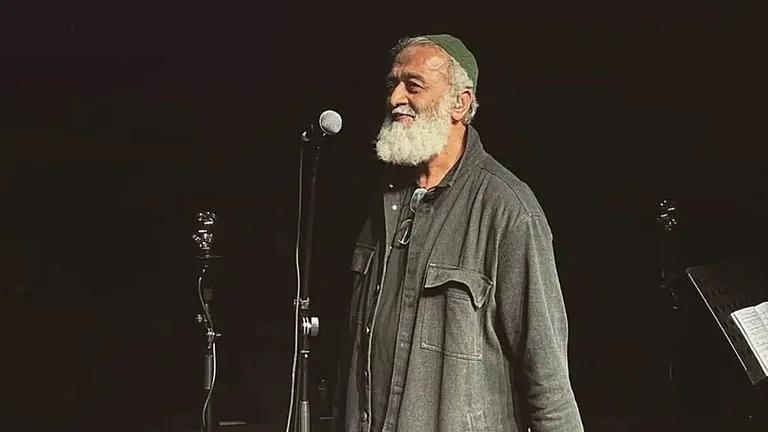HENRIETTA Marx is credited with the bitter wish that her son Karl "would accumulate capital instead of just writing about it". A century later in 1940, Mrs and Mr Satish Chandra Gupta probably wished the same for their younger son, 'Sunny'. Recently returned from Cambridge, where he had successfully negotiated his Tripos, this scion of an upper class Bengali family of aristocratic lineage was expected, at the very least, to follow his grandfather and brother into the Indian Civil Service. Instead, within a year of his arrival in India, Indrajit 'Sunny' Gupta was a whole-timer in the (illegal at the time) Communist Party of India (CPI), working underground.
That is the man who today, at 77, is the Union home minister and general secretary of the CPI—apart from being arguably the best parliamentarian of his generation who in his ninth term commands respect from across the political spectrum. In the news over the past fortnight for what his colleagues term "all the wrong reasons", he is being panned by critics as a true inheritor of S.B. Chavan's foot-in-the-mouth legacy. And sympathetic journalists are analysing the trouble he has got into over his varied statements—on the Congress leadership, the J&K elections, the caste carnage in Bihar and the withdrawal of security cover to top politicians—to his inability to remember that he is no longer a free-wheeling Opposition member. But the key to understanding the man is his past.
Gupta, like others of his ilk, was converted to the cause at university. "An intellectual, rather than a participatory, conversion," is how CPI leader M. Farooqui, a fellow student at St Stephen's in the 1930s, puts it. Thanks mainly to the efforts of the stalwarts of the Left liberal movement such as Rajni Palme Dutt and the assiduous attempts by the Communist Party of Great Britain to 'turn' Indians studying in British universities. The context is equally important. In the 1930s India's struggle for independence intensified and the proponents of a Left agenda were beginning to find a prominent place in the mainstream of the national movement.
And the Indian elite—Macaulay's children, if you wish—in what their progenitor would have considered a classic Judas act were beginning to question the duplicity of imperialist Britain vis-a-vis Indian independence. But Gupta remained pucca through his spell at St Stephens, though surely the inner rumblings which found expression at Cambridge in an atmosphere surcharged with student unrest at the rise of fascism in Europe must have begun.
In June 1941, six months after Gupta offered his services "in any suitable capacity" to the communist cause in India, he was instructed to go underground in Lucknow. His job, in his own words, "was to run a den along with another comrade and distribute illegal Marxist literature. I was a plain and simple courier." After a while he shifted to the party headquarters (PHQ) in Bombay with general secretary P.C. Joshi as his taskmaster. By the time the ban on the CPI was lifted in 1942, Gupta had already been moved to Bengal, and that is where he cut his teeth (and made a name for himself) in the trade union movement.
Many of his associates feel that the zeal with which Gupta immersed himself in the trade unions—especially transport, ports and docks and jute—was at least in part an attempt to 'de-class' himself besides being a logical extension of his creed and conviction. Perhaps, it is Marx himself who provides the answer with his epigram: "The revolutionary daring which hurls at its adversaries the defiant words—'I am nothing and I must be everything'. " Certainly not something Gupta could have got away with, despite his complete rejection of the system that spawned him.
He also carried the additional baggage of being labelled one of "Joshi's glamour boys" in the CPI, though it did not stick as he was too far away from the PHQ. Over the next two decades, Indrajit Gupta, the man, also came to the fore, though he was a relatively lightweight leader at the time of the CPI split in 1964. (According to his associate Chitta Biswas, he was never convinced by the "pro-China" line within the party and he supported Krushchev's secret report to the 20th CPSU Congress exposing Stalin's excesses.)
A great orator in Parliament and a dedicated union leader he was becoming. But he was also increasingly being considered arrogant, gruff to the point of being rude, and with a pen-chant for the cynical one-liner. Attributes which seemed to mature into character traits over the next 20-odd years.
"But what a lot of people don't realise is that Indrajit has always been very shy," says former CPI member and journalist Nikhil Chakravartty. Though one suspects that if Indrajit Gupta ever peers through the looking-glass into Alice's wonderland, he shouldn't have too much trouble recognising a soulmate in the Queen of Spades; the therapeutic value of that imperious bellow—"off with their heads"—may be questionable, but it does provide adequate cover for a basically shy person. Ask any journalist who has dared call Gupta in the evening and had his ear-drum cracked by the irritated roar of "YES?!" instead of the more conventional hello.
And a tale narrated by one of Gupta's oldest associates seems to prove Chakravartty's point: "He was in love with Suraiya (his wife) as a young man but, I hear, could not quite get himself to propose. He married her finally when he was in his 60s, but he had to wait 40 years."
While there are those who can give personal accounts of Gupta's bruising tongue and his deepening cynicism, nobody recalls him ever being abusive. And there are many in the trade unions, who see in him a warm, affectionate, caring and totally dedicated man. Also, close friends speak of his partiality for a drink in the evening—maybe even a smoke—to precede the biryani or fish curry they have cooked for him. It is only they who can say this, because he refuses all other invitations.
Periodically, elements within the broader Left movement feel that Gupta's alleged "aristocratic indifference" and deepening cynicism are an albatross around the CPI's neck. Says a senior party leader: "Gupta as general secretary is not an organisation man in the mould of P.C. Joshi and C. Rajeshwara Rao who could deal with all manner of people. His strengths remain trade unionism and Parliament; and his commitment is unswerving." A degree of cynicism in a man who has seen such a drastic fall in the standard of politicians and political debate is understandable. Especially as he straddles two epochs; one which is fast-diminishing and the other with its "new reality" which is gaining ground. But even his cynicism is laced with a dark humour. As he wrote in an article titled Looking Back Half a Century Ago which appeared in New Age, the CPI organ, in 1995: "The 'must' for every communist's study was the Short History of the CPSU. I wish now that we had given equal thought to Lenin's volumes. But that was more than half a century ago, when we used to imagine that revolution was around the corner!"
Ironically for a Marxist, Gupta's attitude towards politics and politicians can perhaps best be described as mid-Victorian; with the aphorism "you made your bed, so shall you lie on it" remaining unstated, but clear. Take a look at his recent statements with this in mind, and it explains the impulse behind them. Apart from being a calculated attempt to mark the clear blue water between the CPI and the United Front on certain issues, of course. Because in the end, there is no mistaking the fact that Indrajit Gupta is a politician. The inheritor, though, of Nehru rather than Naxalbari.


























